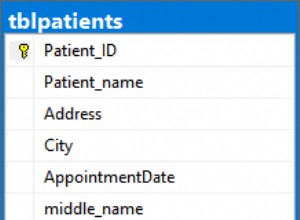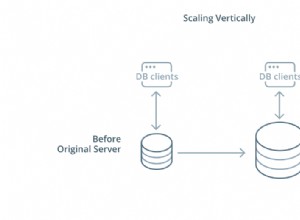Baiklah, saya telah menulis migrasi untuk mencapai ini untuk sistem saya sendiri.
-
Ini memungkinkan Anda untuk secara opsional menentukan nama koneksi untuk merujuk koneksi selain default.
-
Itu mendapatkan daftar tabel dari database koneksi menggunakan
SHOW TABLESkueri. -
Kemudian loop melalui setiap tabel dan memperbarui semua kolom tipe string/karakter ke kumpulan karakter dan susunan baru.
-
Saya telah membuatnya sehingga panggilan balik harus diberikan untuk menentukan apakah kolom harus diubah panjangnya menjadi panjang baru yang disediakan. Dalam implementasi saya,
VARCHARdanCHARkolom dengan panjang lebih dari 191 diperbarui untuk memiliki panjang 191 selama migrasi naik danVARCHARdanCHARkolom dengan panjang tepat 191 diperbarui menjadi 255 pada migrasi mundur/turun. -
Setelah semua kolom string/karakter diperbarui, beberapa kueri akan dijalankan untuk mengubah rangkaian karakter dan susunan tabel, mengonversi semua susunan yang tersisa ke yang baru dan kemudian mengubah rangkaian karakter dan susunan tabel default.
-
Terakhir, rangkaian karakter dan susunan default database akan diubah.
Catatan
-
Awalnya, saya hanya mencoba mengonversi tabel ke pengkodean baru tetapi mengalami masalah dengan panjang kolom. 191 karakter adalah panjang karakter maksimum dalam
utf8mb4saat menggunakan InnoDB di versi MySQL/MariaDB saya dan mengubah susunan tabel menghasilkan kesalahan. -
Saya pada awalnya hanya ingin memperbarui panjang ke panjang baru tetapi saya juga ingin menyediakan fitur rollback, jadi ini bukan pilihan karena dalam metode sebaliknya saya akan mengatur panjang kolom yang
utf8mb4ke 255, yang akan terlalu panjang, jadi saya memilih untuk mengubah susunan juga. -
Saya kemudian mencoba mengubah panjang, rangkaian karakter, dan susunan
varchardancharkolom yang terlalu panjang, tetapi di sistem saya, ini mengakibatkan kesalahan ketika saya memiliki indeks multi-kolom yang menyertakan kolom tersebut. Tampaknya, indeks multi-kolom harus menggunakan susunan yang sama. -
Catatan penting dalam hal ini migrasi mundur/turun tidak akan 100% sempurna untuk semua orang. Saya rasa tidak mungkin melakukannya tanpa menyimpan informasi tambahan tentang kolom asli saat bermigrasi. Jadi implementasi saya saat ini untuk migrasi mundur/turun adalah dengan mengasumsikan bahwa kolom dengan panjang 191 awalnya 255.
-
Catatan penting yang serupa ini adalah bahwa ini akan secara membabi buta mengubah susunan semua kolom string/karakter ke susunan baru, terlepas dari susunan aslinya, jadi jika ada kolom dengan susunan yang berbeda, semuanya akan dikonversi ke yang baru dan sebaliknya akan dilakukan sama, aslinya tidak akan dipertahankan.
<?php
use Illuminate\Database\Migrations\Migration;
class UpgradeDatabaseToUtf8mb4 extends Migration
{
/**
* Run the migrations.
*
* @return void
*/
public function up()
{
$this->changeDatabaseCharacterSetAndCollation('utf8mb4', 'utf8mb4_unicode_ci', 191, function ($column) {
return $this->isStringTypeWithLength($column) && $column['type_brackets'] > 191;
});
}
/**
* Reverse the migrations.
*
* @return void
*/
public function down()
{
$this->changeDatabaseCharacterSetAndCollation('utf8', 'utf8_unicode_ci', 255, function ($column) {
return $this->isStringTypeWithLength($column) && $column['type_brackets'] == 191;
});
}
/**
* Change the database referred to by the connection (null is the default connection) to the provided character set
* (e.g. utf8mb4) and collation (e.g. utf8mb4_unicode_ci). It may be necessary to change the length of some fixed
* length columns such as char and varchar to work with the new encoding. In which case the new length of such
* columns and a callback to determine whether or not that particular column should be altered may be provided. If a
* connection other than the default connection is to be changed, the string referring to the connection may be
* provided as the last parameter (This string will be passed to DB::connection(...) to retrieve an instance of that
* connection).
*
* @param string $charset
* @param string $collation
* @param null|int $newColumnLength
* @param Closure|null $columnLengthCallback
* @param string|null $connection
*/
protected function changeDatabaseCharacterSetAndCollation($charset, $collation, $newColumnLength = null, $columnLengthCallback = null, $connection = null)
{
$tables = $this->getTables($connection);
foreach ($tables as $table) {
$this->updateColumnsInTable($table, $charset, $collation, $newColumnLength, $columnLengthCallback, $connection);
$this->convertTableCharacterSetAndCollation($table, $charset, $collation, $connection);
}
$this->alterDatabaseCharacterSetAndCollation($charset, $collation, $connection);
}
/**
* Get an instance of the database connection provided with an optional string referring to the connection. This
* should be null if referring to the default connection.
*
* @param string|null $connection
*
* @return \Illuminate\Database\Connection
*/
protected function getDatabaseConnection($connection = null)
{
return DB::connection($connection);
}
/**
* Get a list of tables on the provided connection.
*
* @param null $connection
*
* @return array
*/
protected function getTables($connection = null)
{
$tables = [];
$results = $this->getDatabaseConnection($connection)->select('SHOW TABLES');
foreach ($results as $result) {
foreach ($result as $key => $value) {
$tables[] = $value;
break;
}
}
return $tables;
}
/**
* Given a stdClass representing the column, extract the required information in a more accessible format. The array
* returned will contain the field name, the type of field (Without the length), the length where applicable (or
* null), true/false indicating the column allowing null values and the default value.
*
* @param stdClass $column
*
* @return array
*/
protected function extractInformationFromColumn($column)
{
$type = $column->Type;
$typeBrackets = null;
$typeEnd = null;
if (preg_match('/^([a-z]+)(?:\\(([^\\)]+?)\\))?(.*)/i', $type, $matches)) {
$type = strtolower(trim($matches[1]));
if (isset($matches[2])) {
$typeBrackets = trim($matches[2]);
}
if (isset($matches[3])) {
$typeEnd = trim($matches[3]);
}
}
return [
'field' => $column->Field,
'type' => $type,
'type_brackets' => $typeBrackets,
'type_end' => $typeEnd,
'null' => strtolower($column->Null) == 'yes',
'default' => $column->Default,
'charset' => is_string($column->Collation) && ($pos = strpos($column->Collation, '_')) !== false ? substr($column->Collation, 0, $pos) : null,
'collation' => $column->Collation
];
}
/**
* Tell if the provided column is a string/character type and needs to have it's charset/collation changed.
*
* @param string $column
*
* @return bool
*/
protected function isStringType($column)
{
return in_array(strtolower($column['type']), ['char', 'varchar', 'tinytext', 'text', 'mediumtext', 'longtext', 'enum', 'set']);
}
/**
* Tell if the provided column is a string/character type with a length.
*
* @param string $column
*
* @return bool
*/
protected function isStringTypeWithLength($column)
{
return in_array(strtolower($column['type']), ['char', 'varchar']);
}
/**
* Update all of the string/character columns in the database to be the new collation. Additionally, modify the
* lengths of those columns that have them to be the newLength provided, when the shouldUpdateLength callback passed
* returns true.
*
* @param string $table
* @param string $charset
* @param string $collation
* @param int|null $newLength
* @param Closure|null $shouldUpdateLength
* @param string|null $connection
*/
protected function updateColumnsInTable($table, $charset, $collation, $newLength = null, Closure $shouldUpdateLength = null, $connection = null)
{
$columnsToChange = [];
foreach ($this->getColumnsFromTable($table, $connection) as $column) {
$column = $this->extractInformationFromColumn($column);
if ($this->isStringType($column)) {
$sql = "CHANGE `%field%` `%field%` %type%%brackets% CHARACTER SET %charset% COLLATE %collation% %null% %default%";
$search = ['%field%', '%type%', '%brackets%', '%charset%', '%collation%', '%null%', '%default%'];
$replace = [
$column['field'],
$column['type'],
$column['type_brackets'] ? '(' . $column['type_brackets'] . ')' : '',
$charset,
$collation,
$column['null'] ? 'NULL' : 'NOT NULL',
is_null($column['default']) ? ($column['null'] ? 'DEFAULT NULL' : '') : 'DEFAULT \'' . $column['default'] . '\''
];
if ($this->isStringTypeWithLength($column) && $shouldUpdateLength($column) && is_int($newLength) && $newLength > 0) {
$replace[2] = '(' . $newLength . ')';
}
$columnsToChange[] = trim(str_replace($search, $replace, $sql));
}
}
if (count($columnsToChange) > 0) {
$query = "ALTER TABLE `{$table}` " . implode(', ', $columnsToChange);
$this->getDatabaseConnection($connection)->update($query);
}
}
/**
* Get a list of all the columns for the provided table. Returns an array of stdClass objects.
*
* @param string $table
* @param string|null $connection
*
* @return array
*/
protected function getColumnsFromTable($table, $connection = null)
{
return $this->getDatabaseConnection($connection)->select('SHOW FULL COLUMNS FROM ' . $table);
}
/**
* Convert a table's character set and collation.
*
* @param string $table
* @param string $charset
* @param string $collation
* @param string|null $connection
*/
protected function convertTableCharacterSetAndCollation($table, $charset, $collation, $connection = null)
{
$query = "ALTER TABLE {$table} CONVERT TO CHARACTER SET {$charset} COLLATE {$collation}";
$this->getDatabaseConnection($connection)->update($query);
$query = "ALTER TABLE {$table} DEFAULT CHARACTER SET {$charset} COLLATE {$collation}";
$this->getDatabaseConnection($connection)->update($query);
}
/**
* Change the entire database's (The database represented by the connection) character set and collation.
*
* # Note: This must be done with the unprepared method, as PDO complains that the ALTER DATABASE command is not yet
* supported as a prepared statement.
*
* @param string $charset
* @param string $collation
* @param string|null $connection
*/
protected function alterDatabaseCharacterSetAndCollation($charset, $collation, $connection = null)
{
$database = $this->getDatabaseConnection($connection)->getDatabaseName();
$query = "ALTER DATABASE {$database} CHARACTER SET {$charset} COLLATE {$collation}";
$this->getDatabaseConnection($connection)->unprepared($query);
}
}
Tolong, tolong, buat cadangan database Anda sebelum menjalankan ini . Gunakan dengan risiko Anda sendiri!




